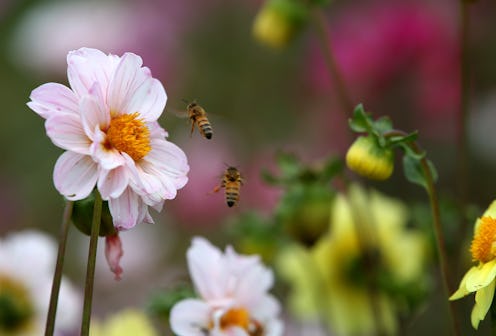News
The White House Has A Plan To Save The Bees
In the last year, beekeepers say they've lost 40 percent of their honey bee colonies, according to the White House. This might not seem like a big deal, but bees pretty much make the world go around. That's why, last July, President Barack Obama directed a special force to set up a national strategy to save honey bees and other pollinators, and the force released the strategy and goals for what some are calling "Plan Bee" on Tuesday.
What's the buzz about that very important buzz, you might ask? Well, according to Michigan State University, many scientists often say that bees are responsible for one out of every three bites of food we eat. The majority of crops grown for their fruits (that includes vegetables like squash, cucumbers, tomatoes, and eggplant) and different nuts, seeds, hays, or fibers (like cotton) need pollination by insects in order to grow, according to MSU. It's one of the few things we haven't managed to fix with technology. What does this mean in dollar signs? Honey bee pollination alone adds more than $15 billion in agricultural crops each year, according to the White House. That's the bee's knees.
But bees and other pollinator populations have been disappearing over the last century from increased pesticide use in agriculture and urban areas — a phenomenon scientists are calling colony collapse disaster. Unfortunately, a lot of farmers just can't let their crops bee. One of the most widely used insecticides in the world, neonicotinoid, may also be one of the leading causes of bee deaths. For example, it is used in more than 95 percent of the U.S. corn crop, according to NPR. Additionally, changes in land use have also resulted in a patchy distribution of food and resources for pollinators, according to MSU.
One of the other, major pollinators in trouble is the Monarch butterfly. Overwintering Monarch populations in Mexico’s forests have declined by 90% or more over the past two decades, which can threaten the iconic annual North American Monarch migration, the White House said. The new strategy, designed by the U.S. Environmental Protection Agency and U.S. Department of Agriculture hopes to address the issue, which even Republican Rep. Ted Yoho, from Florida called “an essential thing [that] we need to pay attention to," according to The Washington Post. The strategy will direct how forests burned from wildfire should be replanted, the landscaping around offices, and the preservation of roadside habitats where bees feed. According to the White House, the plan's three specific goals are to:
1. Reduce honey bee colony losses to economically sustainable levels;
2. Increase monarch butterfly numbers to protect the annual migration; and
3. Restore or enhance millions of acres of land for pollinators through combined public and private action.
Sam Droege, a U.S. Geological Survey wildlife biologist and one of the country’s foremost experts on native bee identification, told the Post that it's about time the White House is officially recognizing the importance of bees:
I have to say that it is mighty darn lovely having the White House acknowledge the indigenous, unpaid and invisible workforce that somehow has managed to sustain all terrestrial life without health-care subsidies, or a single COLA, for that past 250 million years.
But not all scientists were ready to call the President, "honey," even though the plan involves planting 7 million acres of federally owned lands with pollinator-friendly plants, including urban parks and areas around public transportation, in the next five years. Some say Obama should be aggressive, B-E-E aggressive! Tiffany Finck-Haynes, food futures campaigner with Friends of the Earth told Discovery:
President Obama’s National Pollinator Health Strategy does not go far enough to address the unsustainable losses of bees and other pollinators essential to our food system. Failure to address this growing crisis with a unified and meaningful federal plan will put these essential pollinators and our food supply in jeopardy.
Images: Getty Images (4)
